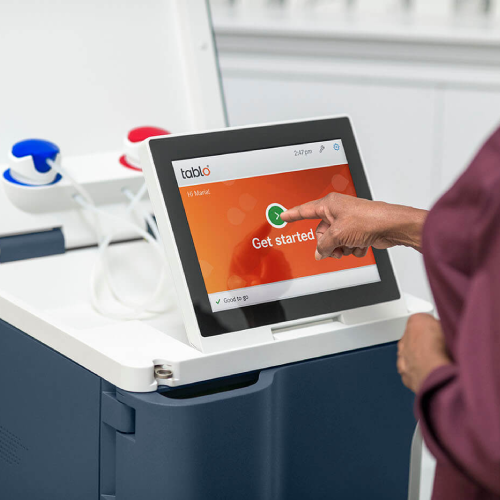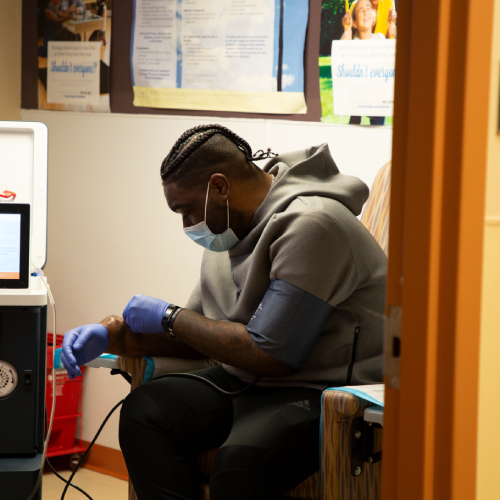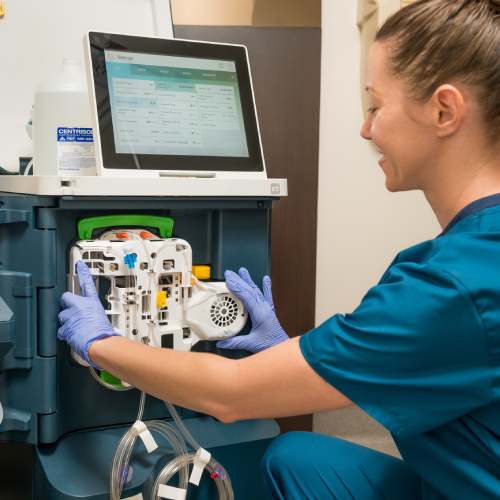Insurance Options
Affordable and Accessible Care: Explore Insurance Coverage for Home Dialysis
Insurance and Costs for Dialysis
Ensuring a comprehensive understanding of insurance coverage and associated costs is crucial when considering dialysis treatment. Our dedicated team is committed to providing the support and information you need to easily navigate insurance intricacies, enabling you to make informed decisions about your dialysis journey.

Primary Health Insurance Options for Dialysis Patients
Several main types of health insurance are commonly available for individuals undergoing dialysis. The primary health insurance options include:
Medicare
Medicare, a federal health insurance program that caters to individuals aged 65 and older, along with those with specific disabilities. It covers 80% of dialysis treatment costs and most expenses for post-transplant medications. Transportation and certain dialysis-related supplies and services are also included.
Medicaid
Medicaid, a health insurance program operated by the state, provides coverage for individuals and families with low income. It covers 100% of dialysis treatment costs, including transportation, and selects supplies and services.
Private Insurance
Private health insurance plans vary in coverage for dialysis treatment. It's important to review your plan to understand the extent of coverage, as it can range from full coverage to partial coverage.

What Is Medicare?
Combine seamlessly fitting layouts, customize everything you want, switch components on the go using our bootstrap.
Medicare
Part A
What it covers
Inpatient hospital stays
Hospice care
Home health care
Cost You May Pay
No monthly premium for Medicare Part A if you qualify based on needing dialysis and having sufficient work credits.
If you are 65+ and lack work credits, you may pay a premium based on the number of credits.
The Deductible for Part A in 2023 is $1,556.
Prolonged hospital stays may entail additional coinsurance payments.
Medicare
Part B
What it covers
Physician services
Outpatient hospital services
Certain home health services
Durable medical equipment
Costs You May Pay
Standard Monthly Premium: $164.90 per month (a decrease of $5.20 from 2022)
Annual Deductible: $226 (a decrease of $7 from 2022)
The coinsurance for Part B in 2023 is 20% of the Medicare-approved amount for most services.
Medicare
Part D
Prescription drug coverage
What it covers
Wide Range of Prescription Drugs
Formulary Coverage
Tiered Structure
Cost you may Pay:
Helps cover the cost of prescription drugs.
There is a monthly premium for Part D, which varies depending on the plan you choose.
You may also have to pay a deductible and coinsurance for some drugs.

Other Medicare Options
- Supplemental (Medigap) plans: Supplemental plans help cover what Medicare Parts A and B do not cover, such as copays, co-insurance and deductibles. For example, it can help pay for the 20% of outpatient dialysis services that Part B does not cover.
- Medicare Advantage plans (previously called Part C): Private insurance companies contract with Medicare to offer these plans. They cover all Part A and Part B benefits, and some also cover Part D.
- Lorem Ipsum is simply dummy text of the printing and typesetting industry. Lorem Ipsum has been the industry's standard dummy text ever since the 1500s.
Medicare Tips for Kidney Patients: Navigating Coverage Options

Eligibility for Medicare
As a kidney patient, you may be eligible for Medicare coverage. Approximately 93% of US citizens can access Medicare when they start dialysis or undergo a kidney transplant. To qualify for Medicare, you must have worked enough and paid Medicare payroll taxes. If you haven't worked enough, you may still be eligible under your spouse's or former spouse's work record.

Understanding Primary and Secondary Insurance:
If you have an employer plan, it will typically be the primary insurance for the first 30 months, regardless of whether you enroll in Medicare. After 30 months, the coverage switches, and Medicare becomes the primary insurance while your other plan becomes secondary.

Coverage and Costs:
Medicare Part B specifically covers dialysis services. However, once you meet your annual Part B deductible, it covers up to 80% of Medicare's allowed charge for dialysis at home or in a clinic. To cover the remaining costs, you'll need a secondary plan, a health plan through work, or Medicaid if you meet certain low-income and asset requirements.

Reviewing Your Medicare Plan Annually:
Reviewing your Medicare plan each year to assess any changes that may impact your coverage for the following year is important. This annual evaluation ensures you still receive the most suitable coverage.
Frequently Asked Questions
United Renal Services (URS) is a specialized healthcare provider aiming to improve individuals' quality of life with kidney disease. We offer renal care solutions, including home dialysis services through an innovative approach to care with state-of-the-art technology with a world-class team. We are located in Woodridge, Illinois, where you can find our training center for patients.
If you are interested in home dialysis, our healthcare professionals will collaborate closely with you to assess your eligibility and suitability for the program. Factors such as your medical condition, lifestyle, and home environment will determine if home dialysis suits you.
Home dialysis offers several benefits, including increased flexibility and convenience, reduced travel time to a dialysis center, greater control over your treatment schedule, and the ability to receive dialysis in the comfort of your home.
Yes, URS is committed to providing comprehensive support throughout the transition to home dialysis. Our experienced healthcare team will guide you through the training process, help you set up the necessary equipment at home, and provide ongoing support to ensure your success with home dialysis.
Yes, URS works with a wide range of insurance providers to ensure patients receive the necessary dialysis treatments without financial burden. Our team will aid you in understanding your insurance coverage and help you navigate the billing process.
To request more information or schedule a consultation with United Renal Services, you can contact our team through our website or our dedicated helpline.
Ask Us A Question
This is just a simple text made for this unique and awesome template, you can replace it with any text.